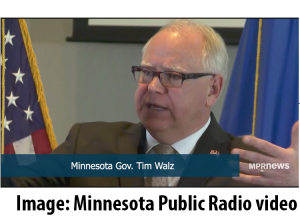Governor Releases 2020-21 Biennial Budget Recommendations
 Gov. Tim Walz released his 2020-21 biennial budget on Tuesday which includes a $733 million increase for E-12 Education. Some of the significant E-12 Education proposals include:
Gov. Tim Walz released his 2020-21 biennial budget on Tuesday which includes a $733 million increase for E-12 Education. Some of the significant E-12 Education proposals include:
-
Formula increase of 3 percent for the first year and an additional 2 percent increase in the second year of the biennium. The Governor does not propose to link the formula to inflation in future years.
-
Restore the level of pre-kindergarten/school readiness plus participants from 3,160 to 7,160.
-
Increase special education aid by $76.78 million for the biennium — a level sufficient to hold the state total cross-subsidy per student steady at the FY 2019 level. The Governor proposes to reduce tuition payments to the serving district to 85 percent in FY 2020 and to 80 percent for FY 2021 and later.
-
The Governor recommends that locally-elected school boards be allowed to renew an expiring referendum by school board action. However, the proposal would require that voters have an opportunity to revoke the board renewed authority in a reverse referendum and that the ballot language provide notice that the referendum may be renewed by the school board. The new authority only applies to referendums approved after July 1, 2019.
-
$2 million per year for the Full Service Community Schools Grant Program.
-
Establish a new position at MDE to conduct stakeholder engagement and draft a plan to double the number of National Board Certified Teachers.
-
$4 million increase in funding for programs to expand and recruit teachers, particularly teachers of color and American Indian teachers.
-
A $3.814 million increase to the MDE for agency operations.
-
Establishes a low level of equalization for the Achievement and Integration levy.
-
$1 million per year to grants to eligible school districts to address the needs of students experiencing homelessness.
-
Provide $9 per pupil in safe schools revenue aid for FY 2020 and increase the safe schools levy from $36 per pupil to $54 per pupil in FY 2021 and later. Equalize the safe schools levy using the same equalizing factor currently used for Long-Term Facilities Maintenance Revenue.
-
Increase funding for the Regional Centers of Excellence by $3 million in FY 2020 and an additional $5 million in FY 2021 to provide assistance to schools and districts identified under the state’s ESSA plan.
You can find further details specific to education using the links below:
You can find further detail using the links below:
- Link: Education Budget Fact Sheet
- Video: Watch the Governor’s announcement on Facebook Live
- Full Budget by Agency, Bill Area
- General Fund Balance Analysis – Detail
- General Fund Balance Analysis – Summary
- General Fund Pie Charts
- General Fund Balance Financial Summaries
- Healthcare Access Fund Statement
- Professional Technical Contracts Report
- Departmental Earnings Summary
- Departmental Earnings Detail – All Agencies
Information on the current biennial budget, for the FY 2018-19 biennium, can be found on the Current Operating Budget webpage.
